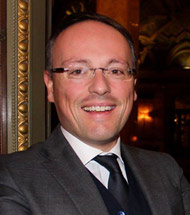To raise awareness of the different religions from elementary school to promote respect for others
Matteo Nacci, Full Professor of the Pontifical Lateran University, proposes in the ICS a model of church-state cooperation within the horizon of the so-called "positive secularism" that guarantees the coexistence of the different confessions.

PHOTO: Courtesy
Promoting policies of openness to encourage the knowledge of all religions from elementary school can generate a breeding ground that promotes reciprocal respect among followers of different faiths. This is the belief of Matteo Nacci, PhD in Canon Law and Philosophy of Law and Full Professor of the Pontifical Lateran University. The expert shared his proposal at the Institute for Culture and Society (ICS), where he gave a seminar from the project 'Religion and Civil Society'.
Professor Nacci proposes a model of cooperation between the church and the State that "is inserted in a positive consideration of the religious phenomenon and in an effective protection of the right to religious freedom without undermining the non-confessional character of a democratic State".
He contrasts this with model , which for so long has predominated in France, but which the same transalpine society "is trying to overcome with the concept of 'positive secularism'". In this positive context, the non-confessionality of a State "should not lead to the abolition of symbols in public spaces," he says, which he considers wrong, "inasmuch as it is proper to human beings to manifest themselves through symbols.
Professor Nacci adds that "atthe social, anthropological and religious level it is necessary to listen to the other" and therefore advocates encouraging the participation of religious institutions in public life. He assures that through "dialogue and cooperation" one avoids the vicious circle in which religions are not known, people are afraid of them, this rejection reinforces the fact that people do not want to know them, and so on.
Application internship of the modelTo make the ideal of 'positive secularism' possible, Professor Nacci considers educational and informative initiatives to be a priority, such as organizing round tables between politicians and representatives of the different religions, setting up institutes and centers that build bridges between communities and States, etc.
He recognizes that mutual understanding is a "more pressing" need in today's world, given globalization and increased migration. As he explains, this has led to countries being made up of many groups of people with diverse beliefs: "This leads to differences in culture, social sensitivity, religious sentiments...".
In this sense, "Spain and Italy," he points out, "are liquid communities, they are no longer made up of people with a unitary thought, there are many identity groups. Professor Nacci points out that Spain and Italy are secular countries, but these liquid communities require the creation of an "ethical, cultural and social" speech that differentiates religions.
